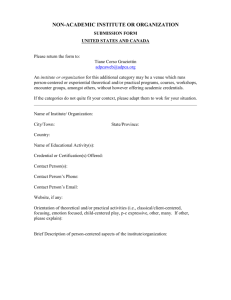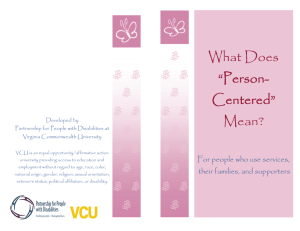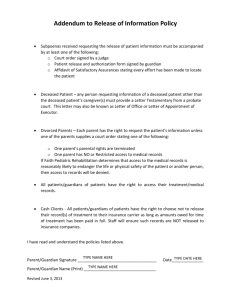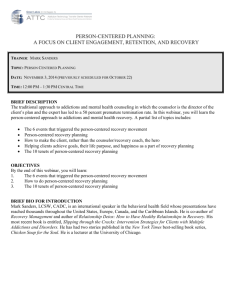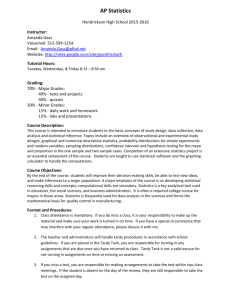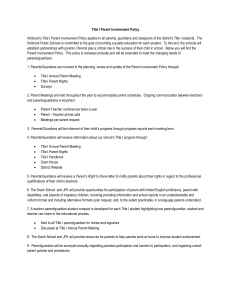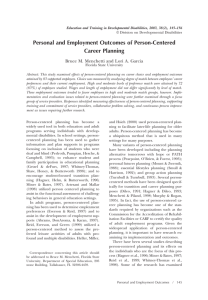The Importance of Person-Centered Practices for Guardians and
advertisement
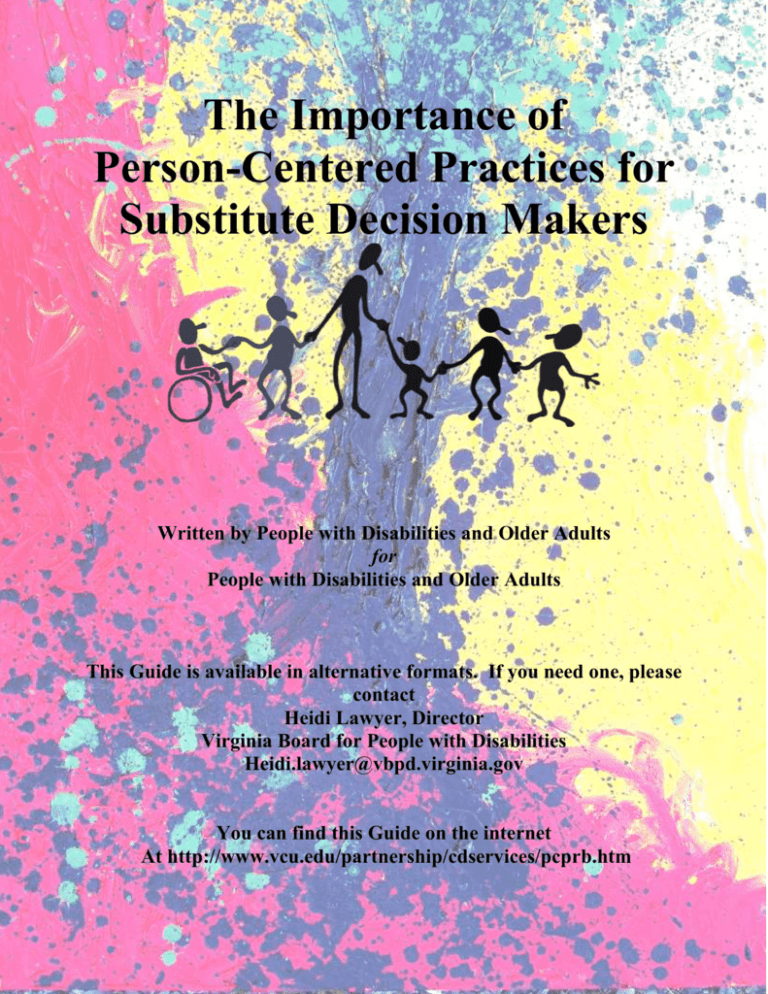
The Importance of Person-Centered Practices for Substitute Decision Makers Written by People with Disabilities and Older Adults for People with Disabilities and Older Adults This Guide is available in alternative formats. If you need one, please contact Heidi Lawyer, Director Virginia Board for People with Disabilities Heidi.lawyer@vbpd.virginia.gov You can find this Guide on the internet At http://www.vcu.edu/partnership/cdservices/pcprb.htm Person Centered Practices for Guardians This document was originally developed by a workgroup of the Community Integration Implementation Team under the auspices of the Governor’s Office of Community Integration, December 2009. It was modified by the Systems Transformation Grant, Goal 2 Resource Team, December 2010. Page 1 of 4 THE IMPORTANCE OF PERSON-CENTERED PRACTICES FOR SUBSTITUTE DECISION-MAKERS A substitute decision-maker is someone who makes decisions for an individual when the individual cannot make his or her own decisions. There are two types of substitute decision-makers discussed below: a “guardian” and a “conservator.” Appointment of a guardian or conservator is a serious thing because it takes away individuals’ rights to make their own decisions. Therefore, it should be considered only as a last resort. There are many alternatives to guardianship and conservatorship that help protect the rights of individuals to make their own decisions as much as possible. For information on these alternatives, please see http://www.vda.virginia.gov/altguardianship.asp. What are Person-Centered Practices? Person-Centered Practices include both “person-centered thinking” and “personcentered planning.” To be person-centered means treating individuals with dignity and respect; building on their strengths and talents; helping people connect to their community and develop relationships; listening and acting on what the individual communicates; taking time to know and understand individuals and the things that make them unique. Person-centered thinking involves a deep respect for individuals and their equality. Person-centered planning involves a process and approach for determining, planning for and working toward what an individual with a disability or an older adult wants for his or her future. Substitute decision-makers play a major role in the lives of those for whom they make life decisions. To effectively do this important responsibility, all surrogate decisionmakers should learn and use person-centered thinking and practices. What is a Guardian? There are times when an individual needs help to make informed decisions for major life choices. A guardian is a person appointed by a Circuit Court to protect an individual who has been declared to be “incapacitated.” Usually, guardians make personal and health care decisions. They may also make decisions such as where an individual lives or his or her daily activities. Circuit Courts can limit the types of decisions a guardian is allowed to make if the individual can make some decisions on his or her own, or care for some of his or her own needs. This is called “limited guardianship.” Under a limited guardianship an individual can keep his or her civil rights, such as the right to vote. Under a full guardianship, the individual is no longer permitted to vote, drive a vehicle or carry a gun unless the judge allows it and puts it in Person Centered Practices for Guardians This document was originally developed by a workgroup of the Community Integration Implementation Team under the auspices of the Governor’s Office of Community Integration, December 2009. It was modified by the Systems Transformation Grant, Goal 2 Resource Team, December 2010. Page 2 of 4 the court order. Protection of an individual’s civil rights is another reason that appointing a guardian should be a decision of last resort. What is a Conservator? A conservator manages only an individual’s financial resources. A conservator’s power may also be limited, depending on the needs of the individual. Only a Circuit Court judge or jury can appoint a conservator. What is “incapacity”? Incapacity is usually the result of a decision by a Circuit Court, based on facts and law, that an individual is not able to make certain decisions. This is not the same as having bad judgment or being forgetful or even foolish. There are differing levels of incapacity, and it can be affected by many things such as the time of day, reaction to a medication (or being overly medicated) and temporary situations such as an automobile accident making a person unconscious. Under Virginia law, sometimes Adult Protective Services (APS) can determine incapacity in order to investigate a report that an individual is being abused, neglected or exploited, or in order to stop an individual from being abused, neglected or exploited. However, only a Circuit Court judge or jury can appoint a guardian or conservator, and that has to be based on a court’s finding of incapacity. Using Person-Centered Practices in Decision Making by Guardians and Conservators When the guardians or conservators know the wishes of the individual they are serving, they should, as much as possible, make the same decision(s) that the individual would make. This is called substitute decision making. This type of decision making is consistent with person-centered practices as described below. There are two basic standards of decision-making. One is the substituted judgment standard. The other is the best interest standard. The substituted judgment standard is most consistent with person centered practices. It means that the guardian, as substitute decision-maker, makes the decision that the individual would make if she or he had not been determined to be incapacitated. The best interest standard is when the guardian makes the decision that he or she believes is in the best interest of the individual regardless of whether it is the same as the individual would choose. For example, the guardian might decide that it is in the best interest of the individual to not eat red meat, Person Centered Practices for Guardians This document was originally developed by a workgroup of the Community Integration Implementation Team under the auspices of the Governor’s Office of Community Integration, December 2009. It was modified by the Systems Transformation Grant, Goal 2 Resource Team, December 2010. Page 3 of 4 even though the individual likes eating beef. It is wrong for guardians or conservators to ignore an individual’s wishes, and it is not consistent with person centered practices. Guardians and conservators should always use the general principals of person-centered practices (PCP). PCP looks at what is important to the individual while taking into account all other factors that affect his or her life, including the effects of a disability, issues of health and safety, and the views of those who know and care about the individual. PCP principles1 include: Listening: The individual’s choices and ideas and description of a good life are respected and followed. Community: Relationships with family, friends and people in the community are very important and at the center of planning. Self Direction: The individual’s choice and control are supported. Talents and Contributions: The experience, talents and contributions of individuals are strengthened and supported. Responsibility: There is shared responsibility for supports and choices. As noted above, the need of an individual for a guardian or conservator, also referred to as substitute decision-makers, does not mean the individual has no right to have his or her voice heard; to have his or her rights and dignity respected at all times; and to have his or her choices honored as much as possible. This is the responsibility of a good substitute decision-maker, and it can happen only if the substitute decision-maker takes the time to develop a relationship with the individual and those who support him or her. Using PCP principles is an excellent way to ensure that this happens. 1 Information taken from the Virginia Person-Centered Practices Leadership Team—Virginia Systems Transformation Grant Resource Team More information about PCP is available at www.vcu.edu/partnership/. Person Centered Practices for Guardians This document was originally developed by a workgroup of the Community Integration Implementation Team under the auspices of the Governor’s Office of Community Integration, December 2009. It was modified by the Systems Transformation Grant, Goal 2 Resource Team, December 2010. Page 4 of 4
